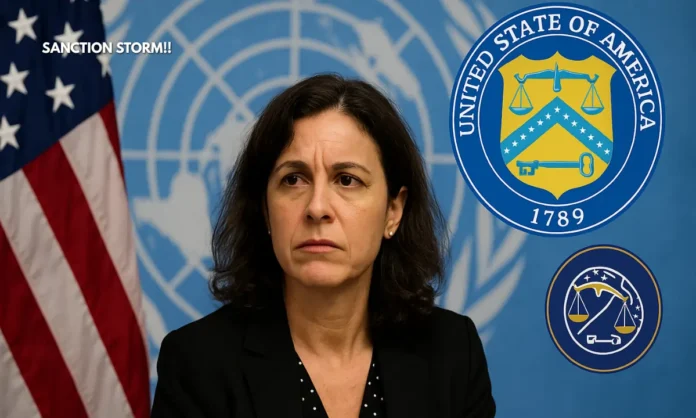SUMMARY
- Trump administration imposes sanctions on UN Special Rapporteur Francesca Albanese for supporting ICC probe into Israeli war crimes.
- Sanctions escalate U.S. hostility toward ICC after warrants against Netanyahu and Gallant.
- Albanese and human rights groups label move as “mafia-style intimidation” against international law defenders.
When Sanctions Silence the Watchdogs of War
In a move that reverberates far beyond diplomatic corridors, the Trump administration has imposed sanctions on Francesca Albanese, the United Nations Special Rapporteur on the occupied Palestinian territories. Her alleged crime? Calling for accountability over the civilian toll of Israel’s Gaza offensive — and publicly supporting the International Criminal Court (ICC)’s legal proceedings against Israeli and American nationals. The decision, announced by U.S. Secretary of State Marco Rubio, signals a deepening rift between Washington and international legal institutions, particularly in light of the ICC’s arrest warrants for Israeli Prime Minister Benjamin Netanyahu and former Defence Minister Yoav Gallant.
Albanese, who has long warned of rising impunity in Gaza and the West Bank, now finds herself targeted by the very powers she sought to hold accountable. The sanctions bar her from entering the U.S. and freeze any assets she may hold within its jurisdiction. While not entirely unprecedented — Trump had sanctioned ICC judges in 2020 — this move marks the first time a UN official has been individually punished for aligning with the ICC’s prosecutorial efforts. In a quiet but defiant response, Albanese affirmed: “I stand firmly and convincingly on the side of justice.”
As international backlash grows, the episode raises critical questions: Can global watchdogs truly function when superpowers retaliate against those who challenge them? And what does it mean for the future of war crimes investigations when international law itself becomes a casualty?
The US sanctioning UN Rapporteur Francesca Albanese is an attack on international law, free speech and the UN. Her only crime? Calling out Israel’s atrocities in Gaza.
— Charlie Herbert (@Charlie533080) July 9, 2025
The US simply cannot handle the truth. 🇵🇸 pic.twitter.com/pgWLKpUQQM
A Legal Battlefield: Trump vs. the International Criminal Court
- U.S. sanctions Albanese amid ICC arrest warrants against Israeli officials.
- Trump expands campaign to discredit and obstruct ICC prosecutions.
- ICC maintains legitimacy despite U.S. and Israeli non-membership.
The U.S. sanctions come just months after the ICC issued arrest warrants for Netanyahu and Gallant over alleged war crimes during Israel’s military operations in Gaza — actions that left more than 57,000 Palestinians dead and displaced over 90% of the population, according to Gaza’s health ministry. The Trump administration, echoing Israel’s rejection of the ICC’s authority, responded by deepening its attacks on the court. Marco Rubio’s statement accused Albanese of “political and economic warfare” for engaging with the ICC and “threatening” U.S. companies with legal repercussions tied to alleged complicity in the Gaza offensive.
While the U.S. is not a party to the Rome Statute that established the ICC, the court’s jurisdiction still applies when crimes are committed on the territory of a member state — in this case, Palestine. Legal experts argue that Washington’s retaliatory tactics, such as sanctioning legal professionals and UN officials, severely undermine the ICC’s independence and send a dangerous signal to countries where the court’s role is essential for justice and reconciliation.
More troubling still is the precedent it sets. If special rapporteurs, whose very mandate is to investigate human rights abuses, can be sanctioned for doing their job, then the foundation of multilateral accountability is in peril.
Voices of Support and Dissent: Albanese Between Applause and Accusation
- Amnesty International and ex-UN officials condemn U.S. sanctions as authoritarian overreach.
- Critics accuse Albanese of antisemitic rhetoric and bias against Israel.
- Albanese defends her record, calling sanctions “mafia-style intimidation”.
Human rights organizations and legal scholars have rushed to defend Francesca Albanese. Former UN rapporteur Agnes Callamard, now head of Amnesty International, condemned the sanctions as an attack on the entire international legal system. “Governments around the world… must do everything in their power to mitigate and block the effect of the sanctions,” Callamard urged.
Albanese’s critics, meanwhile, point to comments made in 2014 referencing the “Jewish lobby” in U.S. politics, which she later said she regretted — while denying that the comment was antisemitic. More recently, she accused dozens of multinational corporations of profiting from “genocide, occupation, and apartheid” in Gaza and the West Bank, warning they risk complicity in war crimes under international law.
The Israeli government has dismissed her findings as “groundless,” and Trump allies have accused her of enabling “terrorism apologism.” Yet Albanese’s defenders maintain that her critiques target policies, not people or identities. Her calls to investigate war crimes in Gaza align with international law, they argue, not political vendettas.
The Cost of Courage: What Albanese’s Sanctioning Means for Global Accountability
The targeting of Francesca Albanese represents far more than a single diplomatic episode. It underscores a growing pattern in global politics — where powerful states punish dissenting voices rather than engage with their critiques. Her sanctioning is not only a rebuke to her work but a warning shot to other human rights defenders, legal scholars, and international institutions who dare to speak truth to power.
As Gaza reels under the weight of one of the deadliest military campaigns in modern history, Albanese’s fate — and the backlash to it — may well define the future of global human rights enforcement. Will international law serve only the interests of those who wield geopolitical clout? Or will it remain a framework where even the powerful are held to account?
For now, Francesca Albanese stands defiant. But the system she represents may be under siege — one sanction at a time.


